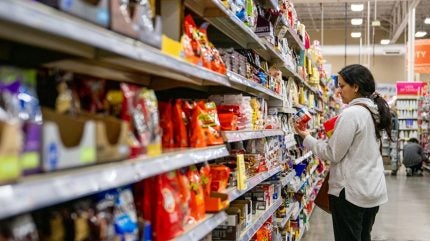
Texas has handed a laws that can require meals producers to position warning labels on gadgets containing sure synthetic colors and components.
Using greater than 40 substances, together with artificial meals dyes and bleached flour, on merchandise bought within the US state would require new labels.
Signed into regulation by Governor Greg Abbott yesterday (22 June), the laws offers producers till 1 January 2027 to take away the substances or, from that date, use the warning labels.
The label should embrace: “WARNING: This product incorporates an ingredient that’s not really useful for human consumption by the suitable authority in Australia, Canada, the European Union or the UK.”
Failure to stick to the labelling necessities may end in every day fines reaching as excessive as $50,000.
Key substances affected embrace generally used components similar to titanium dioxide, BHT and BHA, in addition to emulsifiers similar to DATEM.
In line with the regulation, the label should be “positioned in a distinguished and fairly seen location” and have “sufficiently excessive distinction” to make sure the “warning is prone to be seen and understood by the extraordinary particular person”.
Simply Meals approached trade physique the Client Manufacturers Affiliation for remark.
“It’s unlucky {that a} invoice that can drive shopper confusion and better prices was signed into regulation. Mandating inaccurate warning language on protected, FDA-approved substances misleads shoppers and research have proven interpretive labels are ineffective,” John Hewitt, SVP of state affairs at The Client Manufacturers Affiliation, stated.
The brand new regulation comes amid rising consideration on the recipes of meals and drinks bought within the US since President Trump took workplace earlier this yr.
Throughout a Senate affirmation listening to in January for his nomination as US Secretary of Well being and Human Companies, Robert F. Kennedy Jr. accused the nation’s meals and beverage sector of “poisoning” the American inhabitants.
Kennedy, also referred to as RFK Jr., pledged that, if appointed, he would “scrutinise the chemical components in our meals provide.”
Addressing the Senate Committee on Finance, he claimed the meals trade is the “major perpetrator” behind the nation’s escalating public well being disaster.
In March, West Virginia banned merchandise with seven widespread components and colors. California took related motion in 2023, banning 4 substances, together with potassium bromate and Crimson Dye No. 3.
In April, the FDA introduced plans to get rid of the use of petroleum-derived meals dyes by the tip of the next yr.
As a part of these efforts, the company stated it will start the method of withdrawing approval for 2 artificial color components – Citrus Crimson No. 2 and Orange B – “inside the coming months.”
In January, within the final week of the Biden administration, the US Meals and Drug Administration (FDA) revoked its approval of Crimson Dye No. 3 to be used in meals, dietary dietary supplements, and ingestible drugs, following analysis linking the additive to most cancers in lab animals.

Texas has handed a laws that can require meals producers to position warning labels on gadgets containing sure synthetic colors and components.
Using greater than 40 substances, together with artificial meals dyes and bleached flour, on merchandise bought within the US state would require new labels.
Signed into regulation by Governor Greg Abbott yesterday (22 June), the laws offers producers till 1 January 2027 to take away the substances or, from that date, use the warning labels.
The label should embrace: “WARNING: This product incorporates an ingredient that’s not really useful for human consumption by the suitable authority in Australia, Canada, the European Union or the UK.”
Failure to stick to the labelling necessities may end in every day fines reaching as excessive as $50,000.
Key substances affected embrace generally used components similar to titanium dioxide, BHT and BHA, in addition to emulsifiers similar to DATEM.
In line with the regulation, the label should be “positioned in a distinguished and fairly seen location” and have “sufficiently excessive distinction” to make sure the “warning is prone to be seen and understood by the extraordinary particular person”.
Simply Meals approached trade physique the Client Manufacturers Affiliation for remark.
“It’s unlucky {that a} invoice that can drive shopper confusion and better prices was signed into regulation. Mandating inaccurate warning language on protected, FDA-approved substances misleads shoppers and research have proven interpretive labels are ineffective,” John Hewitt, SVP of state affairs at The Client Manufacturers Affiliation, stated.
The brand new regulation comes amid rising consideration on the recipes of meals and drinks bought within the US since President Trump took workplace earlier this yr.
Throughout a Senate affirmation listening to in January for his nomination as US Secretary of Well being and Human Companies, Robert F. Kennedy Jr. accused the nation’s meals and beverage sector of “poisoning” the American inhabitants.
Kennedy, also referred to as RFK Jr., pledged that, if appointed, he would “scrutinise the chemical components in our meals provide.”
Addressing the Senate Committee on Finance, he claimed the meals trade is the “major perpetrator” behind the nation’s escalating public well being disaster.
In March, West Virginia banned merchandise with seven widespread components and colors. California took related motion in 2023, banning 4 substances, together with potassium bromate and Crimson Dye No. 3.
In April, the FDA introduced plans to get rid of the use of petroleum-derived meals dyes by the tip of the next yr.
As a part of these efforts, the company stated it will start the method of withdrawing approval for 2 artificial color components – Citrus Crimson No. 2 and Orange B – “inside the coming months.”
In January, within the final week of the Biden administration, the US Meals and Drug Administration (FDA) revoked its approval of Crimson Dye No. 3 to be used in meals, dietary dietary supplements, and ingestible drugs, following analysis linking the additive to most cancers in lab animals.









![Fast and Straightforward 15 Minute Rooster Stir-Fry [+ Video]](https://cookio.online/wp-content/uploads/2025/06/15-minute-chicken-stirfry-with-noodles-yakisoba-recipe-12-75x75.jpg)



